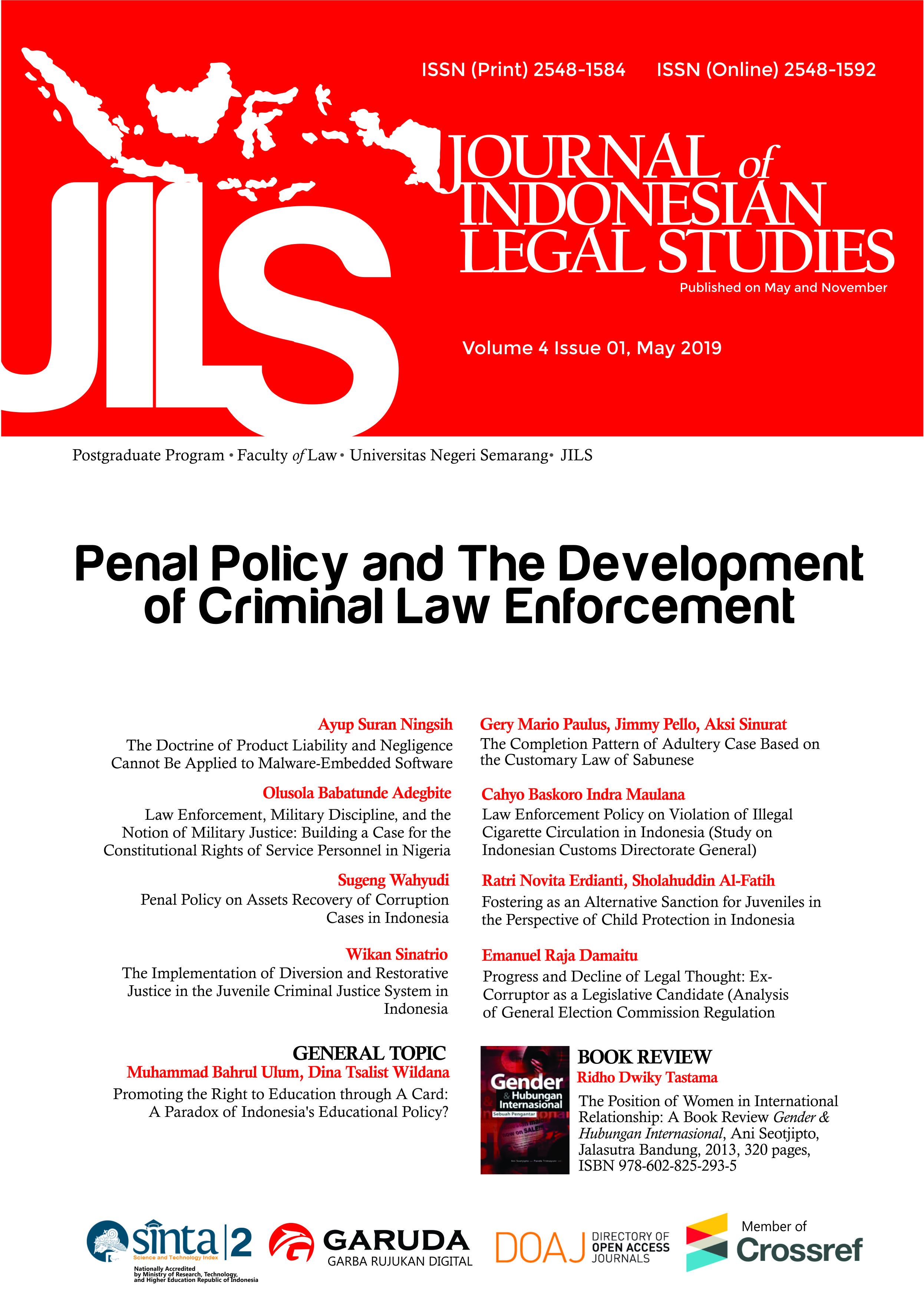Law Enforcement, Military Discipline, and the Notion of Military Justice: Building a Case for the Constitutional Rights of Service Personnel in Nigeria
Main Article Content
Abstract
Law enforcement is the pivot on which every society and institution stands and essentially survives on. An institution where enforcement of the law is in abeyance will surely not endure, as whatever goals are set is condemned to smoulder in total indiscipline. Without doubt, no institution would want to set off on that footing. However, where law enforcement takes place in a special institution like the Military, its deployment is bound to raise deep questions regarding the Constitutional rights of the accused persons. Over the years, the Nigerian Military appear to have been caught in this miasma in which the Constitutional rights of its service men has remained trapped in the notion of upholding Military discipline. It is to this end that this paper appraises the question of law enforcement in the Nigerian Military, querying its attitude towards the safeguards of these rights, and accordingly building a case for a new and better regime, in which Constitutional rights of Service personnel are not only guaranteed, but regarded as pre-eminent.
Article Details

This work is licensed under a Creative Commons Attribution-ShareAlike 4.0 International License.
All writings published in this journal are personal views of the authors and do not represent the views of this journal and the author's affiliated institutions. Author(s) retain copyrights under the licence of Creative Commons Attribution-ShareAlike 4.0 International (CC BY-SA 4.0).
References
Bilsky, Leora Y. Transformative Justice: Israeli Identity on Trial. Michigan: University of Michigan Press, 2004.
Boane, B. “How Unique Should the Military Be? A Review of Representative Literature & Outline of a Synthetic Formulationâ€, European Journal of Sociology, 31(1), 1990: 3-59.
Brand, C.E. Roman Military Law. Texas: University of Texas Press, 1968.
Clausewitz, Carl Von On War, Anatol Rapoport (ed.), London, United Kingdom: Penguin Books, 1968.
Dawson, Doyne & Dawson, James D. The Origins of Western Warfare: Militarism and Morality in the Ancient World. New York, London: Taylor & Francis Group, 1996.
Fapohunda, Olawale. “Roundtable on the Administration of Military Justice System in Nigeria, A Special Session of the Nigerian Military Human Rights Dialogueâ€, The Nigerian Voice, October 3, 2016, accessed 27/05/2018.
Ghiotto, Anthony J. “Back to the Future with the Uniform Code of Military Justice: The Need to recalibrate the Relationship between the Military Justice System, Due Process, and Good Order and Disciplineâ€, North Dakota Law Review, 90(3), 2014: 485-544.
Green, L. C. “Superior Orders and the Reasonable Manâ€, Canadian Yearbook of International Law/Annuaire Canadien de Droit International, 8(1), 1970: 61-103.
Hapner, A. M. “You Have the Right to Remain Silent, But Anything You Don’t Say May Be Used Against You: The Admissibility of Silence as Evidence After Salinas v. Texasâ€, Florida Law Review, 66 (4), 2015: 1763-1778.
Henderson, Gordon D. “Courts-Martial and the Constitution: The Original Understandingâ€, Harvard Law Review, 71(2), 1957: 293-324.
Hirschhorn, James M. “The Separate Community: Military Uniqueness and Servicemen's Constitutional Rightsâ€, North Carolina Law Review, 62(2), 1984: 177-254.
Huntington, Samuel P. The Soldier and the State: The Theory and Politics of Civil-Military Relations, London: Belknap Press, 1957.
Insco, James B. “Defense of Superior Orders before Military Commissionsâ€, Duke Journal of Comparative & International Law, 13(2), 2003: 389-418.
ICRC, ‘Military Discipline and the Law’, International Committee of the Red Cross (ICRC), September, 2011, accessed 27/05/2018.
King, Henry T. “The Legacy of Nurembergâ€, Case Western Journal of International Law, 34 (3), 2002: 335-356.
Langbein, J. H. “The Privilege Against Self Incrimination: Its Origin and Development†in Hemholz et al (eds), The Privilege against Self-Incrimination: It’s Origins and Development. Chicago: University of Chicago Press, 1997.
Lippman, Matthew. R. “Humanitarian Law: The Development and Scope of the Superior Orders Defenceâ€, Penn State International Law Review, 20(1), 2001: 153-251.
McCoy, Francis T. “Due Process for Servicemen-The Military Justice Act of 1968â€, William & Mary Law Review, 11(1), 1969: 66-105.
Miller, Richard B. Casuistry and Modern Ethics: A Poetics of Personal Reasoning, Chicago: University of Chicago Press, 1996.
Moghalu, K.C. Global Justice: The Politics of War Crime Trials. Greenwood Publishers, 2006.
Monroe, David G. “When a Soldier Breaks the Lawâ€, Journal of Criminal Law & Criminology, 33(3), 1942: 245-254.
Shakespeare, William. King Henry V, Paul W. Collins (ed)., Hampshire, United Kingdom: Cengage Learning EMEA, 1995) 264-265.
Ulmer, S. Sidney. Military Justice and the Right to Counsel. Kentucky: University of Kentucky Press, 2015.
Wiener, Frederick B. “Courts-Martial and the Constitution: The Original Practice Iâ€, Harvard Law Review, 72(1), 1958: 1-49.
Wiener, Frederick B. “Courts-Martial and the Constitution: The Original Practice IIâ€, Harvard Law Review, 72(2), 1958: 266-304.
Westmoreland, W. “Military Justice - A Commander's Viewpointâ€, American Criminal Law Review, 10(1), 1971: 1-5.
Laws and Regulations
Nigeria, The Constitution of the Federal Republic of Nigeria, 1999 (as amended to 2010).
Nigeria, The Police Act, Laws of the Federation of Nigeria (LFN), 2004.
Nigeria, Nigerian Educational Research and Development Council Act, Laws of Federation of Nigeria (LFN), 2004 (1993 No.105).
Nigeria, The Armed Forces Act, Laws of the Federation of Nigeria (LFN), 2004.
Nigeria, Rule of Procedure, No.8, Fundamental Rights (Enforcement Procedure) Rules, 2009.
Nigeria, The Armed Forces (Disciplinary Proceedings) (Special Provisions) Act, Laws of the Federation of Nigeria (LFN), 2004.
The Constitution of the United States.
Legal Cases
Case Miranda v. Arizona, 384 U.S. 436 (1966).
Case Berkemer v. McCarty, 468 U.S. 420 (1984).
Case Berghuis v. Thompkins, 560 U.S. 370 (2010).
Case United States ex rel. Roberson v. Keating, 121 F. Supp 477 (N.D. Ill. 1949).
Case United States v. Stuckey,10 MJ 347, 349 (CMA 1981).
Case Weiss v. United States, 510 U.S. 163 (1994).
Case Winters v. United States, 89 S.Ct. 57, 59-60, 21 L.Ed.2d 80, 84 (1968).
Case United States v. Easton (71 M.J. 168, 174-75, C.A.A.F. 2012)
